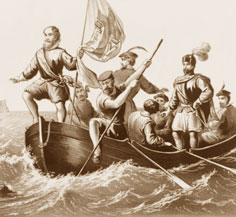|
Digital
History>eXplorations>Columbus
& the Columbian Exchange

 |
1492
is the most significant year in modern world history.
Not only did it bring the Old and New Worlds together,
it also initiated a set of changes that would have vast
implications for the future.
It
contributed to the rise of the transatlantic slave trade
and a vast movement of people, animals, food, plants,
and diseases that would transform the world. |

|
| |
|
|
Alfred Crosby, Professor Emeritus, University of Texas at Austin stated:
"Millions of years ago, continental drift carried the Old World
and New Worlds apart, splitting North and South America
from Eurasia and Africa. That separation lasted so long that
it fostered divergent evolution; for instance, the development
of rattlesnakes on one side of the Atlantic and vipers on the
other. After 1492, human voyagers in part reversed this tendency.
Their artificial re-establishment of connections through the
commingling of Old and New World plants, animals, and bacteria,
commonly known as the Columbian Exchange, is one of the more
spectacular and significant ecological events of the past millennium."
from History Now, Issue 12, June 2007
http://www.historynow.org/06_2007/historian2.html
Essential
questions:
1.
What is Columbus's place in history?
2. What was the historical significance of 1492?
3. What is the Columbian Exchange?
(The trans-continental transfer
of people, food, plants, animals, and pathogens)
4. Did Columbus's voyages add to or detract from human happiness?
|
